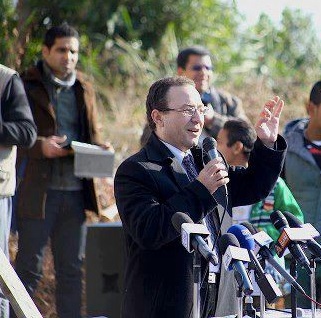CAIRO: If Cairo’s metro is part of your daily commute, you might have noticed recent developments in services, from renovated platforms to a more efficient staff.
You might have also heard the regular public announcements that keep passengers informed on Metro regulations and other important information.
This has largely been the task of Cairo metro’s new management, the Egyptian Company for Metro (ECM), which took over in July 2008.
“I don’t know about metro, but I do know about management, said Mohamed Shimy, chairman and managing director of ECM.
Shimy aims at changing people’s perception of riding the metro. “Egyptian people . just need a system, he said. Shimy believes that if passengers follow a system in place – for example queuing to get tickets – it will reflect on their overall experience.
He aims at providing the passengers with high quality services to promote the metro as a reliable and main public transportation means in Cairo.
For the average 2.5 million passengers that use Cairo’s metro daily, it is an indispensable mode of transportation.
Since he took over, Shimy worked on increasing the number of trips the metro took everyday by 25 percent from 900 trips to 1,180 trips.
Shimy said ECM succeeded in reducing the time headway in the first line from six minutes to four minutes and to three minutes in the second line from 7 am to 7 pm.
In his presentation to Prime Minister Ahmed Nazif on the metro’s recent developments, Shimy said ECM’s strategy is to “have the metro managed like an investment company, improving safety, health and environmental conditions.
Along with raising ECM’s morale, Shimy also promised to enhance “corporate social responsibility.
He also works to attain the optimal return on assets from resources, in order to cover the operating cost and the required investment on capital.
ECM is working on eliminating peddlers wandering in the stations by increasing the fine imposed from LE 10 to LE 100. The company has established marketing and sales units, which is unusual for utilities companies.
Plan in motion
ECM’s two-year plan includes renovating stations such as Hadayek Maadi, Mary Girgis and Sayeda Zeinab and working on the infrastructure of others, such as Ghamra and Dar El-Salam.
The longer term five-year plan involves renovating the trains and their ventilation systems.
Shimy said ECM received tender offers from South-East Asia, Europe and Japan to add 20 new trains to the fleet of 48 trains. “We are still studying these offers, it will take six more months to complete the studies and another three years to have the trains delivered, he explained.
The transition from a public authority to a joint stock company has fueled speculations that it’s a step to privatize the metro system.
“Could we privatize the Pyramids? Shimy told Daily News Egypt, denying any plans to privatize the metro system.
Owned by the Egyptian Railway Authority, ECM was previously called the Egyptian Company for the Management and Operation of the Metro before it became a joint stock company.
Recently ECM struck a LE 256 million deal with Al-Ahram Advertisement Agency, giving it use of the metro’s facilities as advertising space for 10 years. The deal includes a flat rate that will offer ECM additional commission.
Shimy refused to disclose the renovation budget, saying “these details don’t interest the readers.
Before taking over in March 2009, Shimy’s was the vice president of the state-owned Misr Petroleum Company. He holds a BSC in Electric Power from Ain Shams University and a master’s degree in management from the American University in Cairo (AUC).
A challenge ahead of ECM is upgrading the Helwan-Marg line as well as the Giza-Shubra line to be compatible with the third line.
The third line between Imbaba and Cairo airport is scheduled to operate in October 2011.
Currently, the Cairo Metro has two lines, operates over 65 km in 55 stations with 88 trains.
